
 i_need_contribute
i_need_contribute

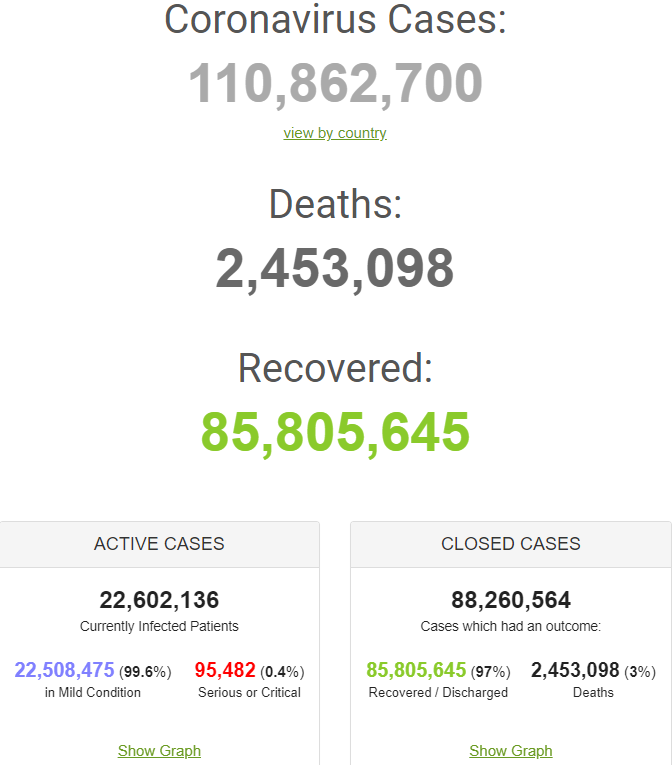
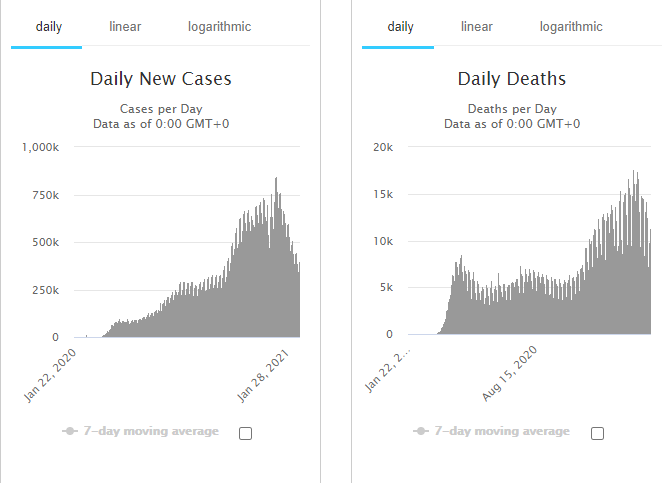
|
Country, |
Total |
New |
Total |
|
World |
110,823,719 |
+398,500 |
2,451,494 |
|
28,523,524 |
+68,924 |
505,309 |
|
|
10,962,189 |
+12,643 |
156,123 |
|
|
10,030,626 |
+51,350 |
243,610 |
|
|
4,125,598 |
+13,447 |
81,926 |
|
|
4,083,242 |
+12,057 |
119,387 |
|
|
3,536,648 |
+22,501 |
83,393 |
|
|
3,121,687 |
+14,515 |
66,704 |
|
|
2,765,412 |
+13,762 |
94,887 |
|
|
2,616,600 |
+7,241 |
27,821 |
|
|
2,372,209 |
+9,825 |
67,547 |
|
|
2,212,525 |
+4,824 |
58,334 |
|
|
2,046,795 |
+7,671 |
50,857 |
|
|
2,013,563 |
+8,988 |
177,061 |
|
|
1,614,446 |
+9,073 |
41,582 |
|
|
1,550,142 |
+8,066 |
59,264 |
|
|
1,498,766 |
+2,327 |
48,708 |
|
|
1,287,141 |
+6,237 |
24,852 |
|
|
1,261,804 |
+9,667 |
44,489 |
|
|
1,252,685 |
+9,039 |
33,969 |
|
|
1,123,404 |
+10,921 |
18,823 |
|
|
1,042,674 |
+4,518 |
15,089 |
|
|
837,497 |
+3,315 |
21,498 |
|
|
792,829 |
+1,944 |
15,754 |
|
|
788,142 |
+3,828 |
19,798 |
|
|
771,843 |
+3,058 |
19,659 |
|
|
743,882 |
+2,677 |
21,793 |
|
|
741,934 |
+3,305 |
5,509 |
|
|
657,453 |
+3,896 |
13,220 |
|
|
567,261 |
+1,272 |
12,488 |
|
|
555,157 |
+1,738 |
11,672 |
|
|
542,268 |
+391 |
8,329 |
|
|
480,056 |
+477 |
8,524 |
|
|
439,841 |
+1,967 |
8,312 |
|
|
429,048 |
+2,561 |
4,292 |
|
|
420,408 |
+1,393 |
7,196 |
|
|
394,023 |
+2,853 |
14,035 |
|
|
374,029 |
+327 |
6,450 |
|
|
361,877 |
+3,294 |
1,073 |
|
|
356,744 |
+1,638 |
4,512 |
|
|
348,810 |
+2,730 |
4,206 |
|
|
334,463 |
+708 |
5,694 |
|
|
285,419 |
+2,555 |
6,271 |
|
|
274,875 |
+2,712 |
1,030 |
|
|
273,659 |
+1,386 |
1,885 |
|
|
273,166 |
+96 |
2,058 |
|
|
269,860 |
+1,641 |
15,444 |
|
|
267,313 |
+365 |
3,399 |
|
|
238,866 |
+365 |
5,399 |
|
|
238,495 |
+789 |
11,303 |
|
|
234,428 |
+1,086 |
9,786 |
|
|
232,780 |
+1,043 |
3,007 |
|
|
232,636 |
+145 |
3,190 |
|
|
226,015 |
+899 |
7,684 |
|
|
212,647 |
+896 |
4,082 |
|
|
206,065 |
+468 |
2,319 |
|
|
204,924 |
+869 |
2,540 |
|
|
201,241 |
+353 |
2,756 |
|
|
192,323 |
+495 |
3,132 |
|
|
182,484 |
+878 |
3,755 |
|
|
181,484 |
+979 |
1,027 |
|
|
176,333 |
+656 |
10,201 |
|
|
176,059 |
+1,400 |
6,221 |
|
|
174,155 |
+1,340 |
3,717 |
|
|
171,154 |
+627 |
1,956 |
|
|
169,820 |
+223 |
3,156 |
|
|
169,610 |
+730 |
6,186 |
|
|
162,584 |
+857 |
3,933 |
|
|
159,053 |
+462 |
256 |
|
|
150,246 |
+877 |
1,803 |
|
|
150,179 |
+871 |
2,249 |
|
|
148,622 |
+1,369 |
3,008 |
|
|
141,709 |
+19 |
3,191 |
|
|
138,494 |
+288 |
1,549 |
|
|
134,781 |
+462 |
1,303 |
|
|
128,740 |
+392 |
2,061 |
|
|
115,705 |
+648 |
414 |
|
|
111,418 |
+171 |
2,950 |
|
|
103,615 |
+283 |
1,807 |
|
|
98,174 |
+371 |
3,018 |
|
|
96,838 |
+1,112 |
1,617 |
|
|
89,806 |
+11 |
4,636 |
|
|
85,689 |
+70 |
1,447 |
|
|
85,567 |
+621 |
1,544 |
|
|
79,548 |
+51 |
622 |
|
|
79,351 |
+708 |
1,521 |
|
|
78,689 |
+418 |
568 |
|
|
78,420 |
+514 |
430 |
|
|
72,467 |
+790 |
991 |
|
|
70,658 |
+484 |
926 |
|
|
67,824 |
+326 |
607 |
|
|
59,832 |
+11 |
29 |
|
|
58,546 |
+172 |
1,776 |
|
|
8,838 |
+6 |
168 |
|
|
7,553 |
+40 |
70 |
|
|
2,347 |
+18 |
35 |
Retrieved from: https://www.worldometers.info/coronavirus/
From CNN's Swati Gupta
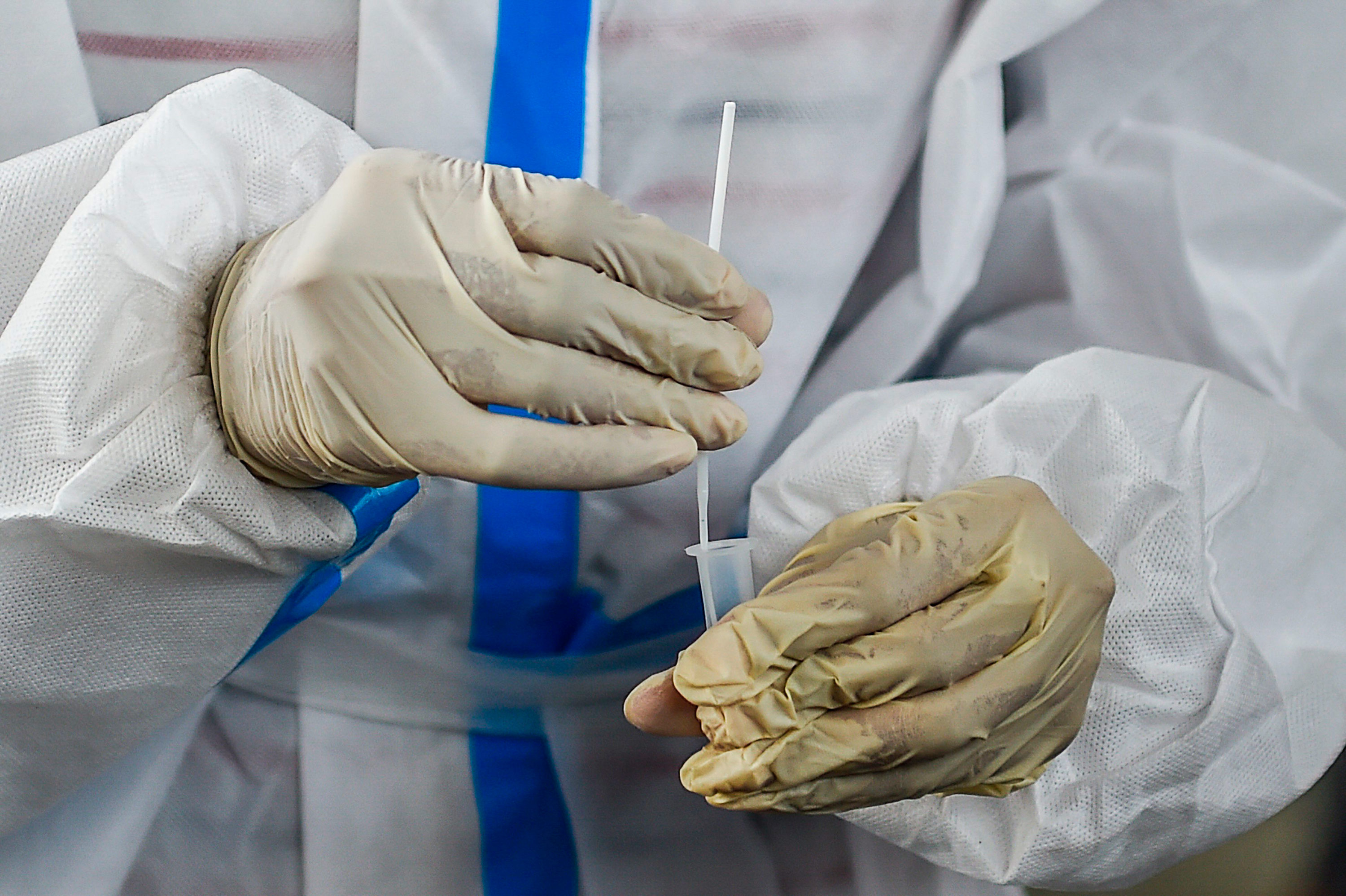
A health worker collects a nasal swab for a Covid-19 test at a railway platform in Mumbai, on February 17. Punit Paranjpe/AFP/Getty Images
India’s western state of Maharashtra has announced fresh restrictions to combat a surge in Covid-19 cases across the state, especially in Mumbai, the local administration said Thursday.
Local officials in Mumbai have begun stamping hands of those who are meant to be quarantining at home, and the government says they will be enforcing all Covid-19 restrictions for public gatherings and mask mandates.
Any violation of the fresh restrictions “will lead to action against organizers and concerned management,” the local government warned.
Among other measures announced, Mumbai will mandate a compulsory seven-day institutional quarantine for all passengers arriving from Brazil.
Three other districts have been directed by the state government to take immediate preventive measures as the number of cases have also surged in these areas.
The state of Maharashtra recorded more than 5,400 cases within 24-hours Thursday, including 38 deaths, according to the state government.
From CNN’s Tatiana Arias
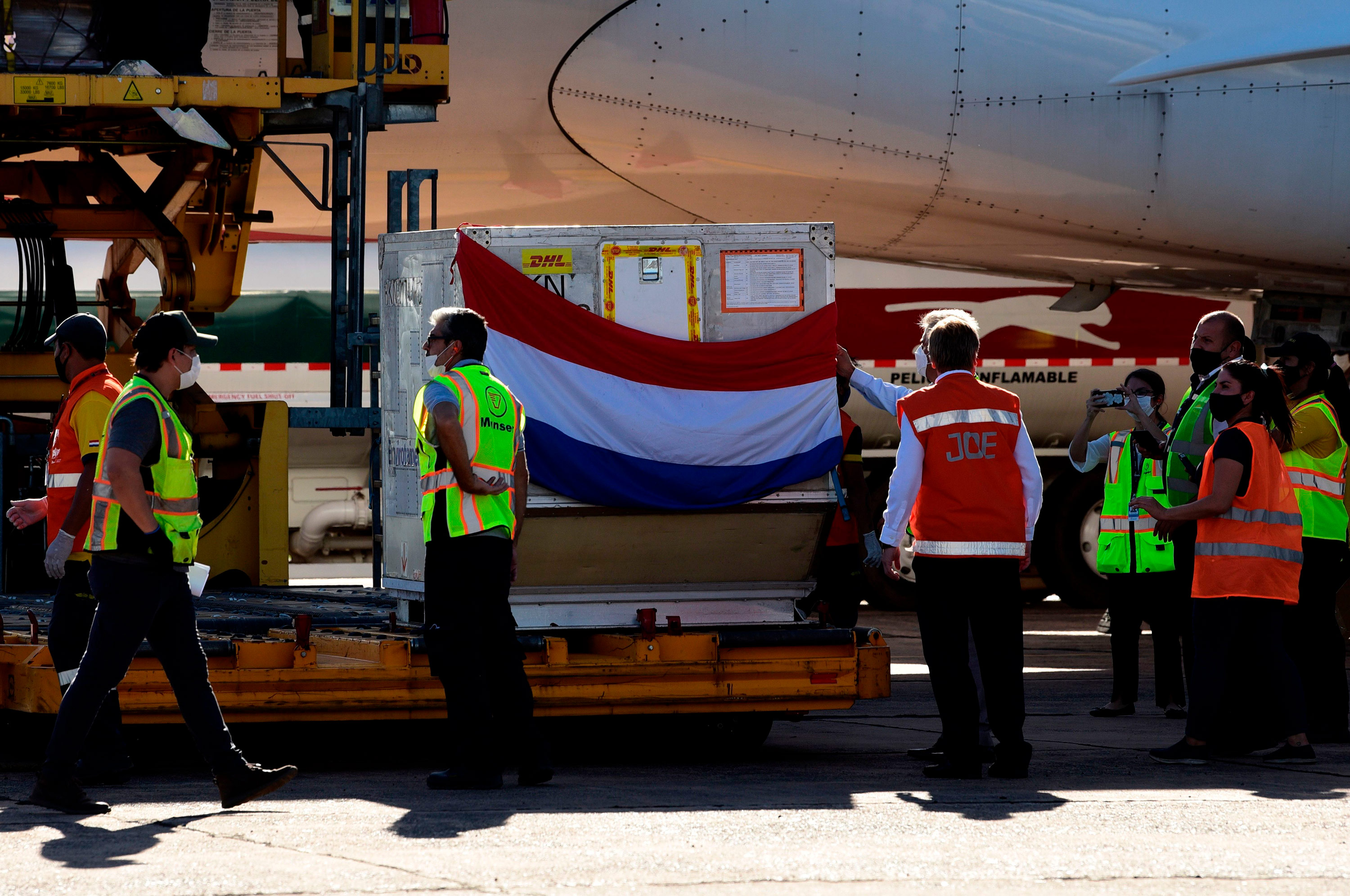
A batch of Russian Sputnik V coronavirus vaccines is unloaded from a plane at Silvio Pettirossi International Airport in Luque, Paraguay, on February 18. Norberto Duarte/AFP/Getty Images
Paraguay received its first batch of Covid-19 vaccines Thursday through a government purchase of 4,000 doses of the Russian Sputnik V vaccine.
The country will roll out its vaccination campaign Monday by immunizing front-line health workers in the ICU, according to health authorities.
“A total of one million Sputnik V vaccines were purchased through direct negotiations with the Russian Fund, the vaccine's manufacturing agency. On Wednesday, Presidents Mario Abdo Benítez and Vladimir Putin had a telephone conversation and it was agreed to expedite the procedures for the shipment of 300,000 doses,” a statement from the Paraguay Ministry of Health published Thursday says.
Paraguay approved the emergency use of the Russian vaccine on January 15. The country also expects to receive 4.3 million doses of the AstraZenaca vaccine purchased via COVAX, an initiative to provide equitable global access to Covid-19 vaccines.
Paraguay has recorded 148,622 confirmed cases and 3,008 coronavirus related deaths, according to the latest tally from Johns Hopkins University.
From CNN's Lauren Mascarenhas
Food and food packaging are highly unlikely to spread Covid-19, the US Food and Drug Administration, US Department of Agriculture and the Centers for Disease Control and Prevention said in a reminder Thursday.
“Consumers should be reassured that we continue to believe, based on our understanding of currently available reliable scientific information, and supported by overwhelming international scientific consensus, that the foods they eat and food packaging they touch are highly unlikely to spread SARS-CoV-2,” the FDA wrote in a statement.
The three agencies said they wanted to stress the lack of credible evidence to suggest that food or its packaging are associated with transmission of the virus.
Covid-19 is a respiratory illness spread from person to person, unlike foodborne viruses that can make people sick through contaminated food, the FDA said.
“Given that the number of virus particles that could be theoretically picked up by touching a surface would be very small and the amount needed for infection via oral inhalation would be very high, the chances of infection by touching the surface of food packaging or eating food is considered to be extremely low,” it added.
“Considering the more than 100 million cases of COVID-19, we have not seen epidemiological evidence of food or food packaging as the source of SARS-CoV-2 transmission to humans.”
Chinese officials have repeatedly raised the possibility the virus is spread by packaged frozen foods, but the CDC and World Health Organization have both said this is highly unlikely.
From CNN's Lauren Mascarenhas
Even seemingly minor things can set back vaccine production by months, Dr. Anthony Fauci, director of the National Institute of Allergy and Infectious Diseases, said talking about the Johnson & Johnson vaccine supply mix up.
The US had been expecting between 20 to 30 million Johnson & Johnson vaccine doses by April, but now expects fewer than 20 million by that time. An administration official told CNN on Tuesday that the change was due to a miscommunication. The administration now expects single digit millions of doses to initially be available, if the vaccine is authorized for emergency use.
“The issue is, we would have hoped that we would have gotten more vaccines at the time that they get their emergency use authorization,” Fauci said in an MSNBC interview Thursday.
“It's a really complicated situation, when you're dealing with the production of biologics. Things – minor things – seemingly minor can set you back by weeks or a month or so,” he added.
Johnson & Johnson is on track to meet its promise of producing 100 million vaccine doses for the US by July, Fauci said.
“We would have hoped that we would have had a lot of vaccines available, but we don't,” he said. “We're going to probably have single digits vaccine available right away, a bit more the next month, and then after that, it'll really scale up so that they will almost certainly meet their contractual arrangement.”
Johnson & Johnson has asked the Federal Drug Administration to authorize its vaccine for emergency use and an independent review of the vaccine is scheduled for Feb. 26.
Retrieved from: https://edition.cnn.com/world/live-news/coronavirus-pandemic-vaccine-updates-02-19-21/index.html

People arrive to get vaccinated at the Maccabi Health vaccination centre in the Israeli coastal city of Tel Aviv-Jaffa.Credit...Jack Guez/Agence France-Presse — Getty Images
Israel has raced ahead with the fastest Covid-19 vaccination campaign in the world, inoculating nearly half its population with at least one dose. Now its success is making it a case study in setting rules for a partially vaccinated society — raising thorny questions about rights, obligations and the greater good.
Prime Minister Benjamin Netanyahu’s cabinet voted this week to open shopping malls and museums to the public, subject to social distancing rules and mandatory masking. For the first time in many months, gyms, cultural and sports events, hotels and swimming pools will also reopen, but only for some.
Under a new “Green Badge” system that functions as both a carrot and a stick, the government is making leisure activities accessible only to people who are fully vaccinated or recovered starting from Sunday. Two weeks later, restaurants, event halls and conferences will be allowed to operate under those rules. Customers and attendees will have to carry a certificate of vaccination with a QR code.
Israel is one of the first countries grappling in real time with a host of legal, moral and ethical questions as it tries to balance the steps toward resuming public life with sensitive issues such as public safety, discrimination, free choice and privacy.
“Getting vaccinated is a moral duty. It is part of our mutual responsibility,” said the health minister, Yuli Edelstein. He also has a new mantra: “Whoever does not get vaccinated will be left behind.”
Four million Israelis — nearly half the population of nine million — have received at least one dose of the Pfizer vaccine, and more than 2.6 million have gotten a second dose. But about two million eligible citizens aged 16 or over have not sought vaccines. The average number of new daily infections is hovering around 4,000.
Israel’s central government — eager to bring the country out of its third national lockdown without setting off a new wave of infections — was spurred into action by local initiatives. Chafing under the country’s lockdown regulations, an indoor shopping mall in the working-class Tel Aviv suburb of Bat Yam threw its doors open last week for customers who could prove that they had been vaccinated or had recovered from Covid-19.
In Karmiel, the mayor made a similar decision to open his city in the northern Galilee region for business. Other mayors want to bar unvaccinated teachers from classrooms while some hoteliers threatened unvaccinated employees with dismissal.
Mr. Edelstein, the health minister, said on Thursday that vaccination would not be compulsory in Israel. But his ministry is now proposing legislation that would oblige unvaccinated employees whose work involves contact with the public to be tested for the virus every two days. And he is promoting a bill that would allow the ministry to identify unvaccinated people to the local authorities.
Retrieved from: https://www.nytimes.com/live/2021/02/18/world/covid-19-coronavirus
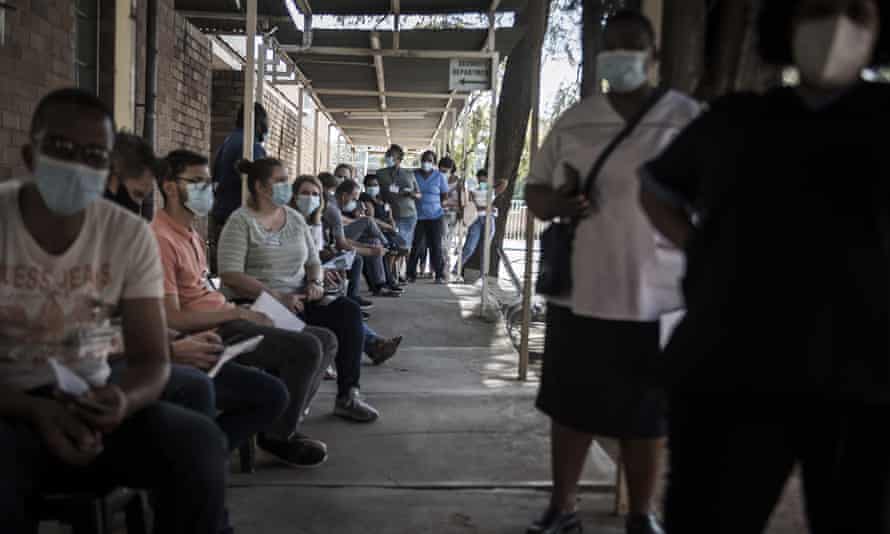
Healthcare workers queue to receive a Johnson & Johnson vaccine at the government hospital in Klerksdorp, South Africa. Photograph: Shiraaz Mohamed/AP
The domination of global medicine by major pharmaceutical companies needs to be confronted to provide fairer access to vaccines, a leading South African official has said.
The scramble over Covid vaccines should alert rich countries to the power of profit-driven companies that control production of crucial medicines, said Mustaqeem De Gama, South Africa’s delegate at the World Trade Organization (WTO) on intellectual property rights.
“While Rome is burning, we are fiddling around [waiting],” said De Gama, who called on nations where many of these pharmaceutical firms are based to stop blocking a patent waiver proposed at the WTO.
Backed by dozens of developing countries, the proposal, introduced by South Africa and India, argued that bypassing intellectual property rights would allow more of the world’s population to be quickly vaccinated by boosting production.
“The first effective vaccines were ready four or five months ago. Do you think it would have made a difference if we had the capacity to manufacture? I certainly think so.”
Supplies are low after rich countries bought more vaccines than they needed to, leading to predictions that many low-income countries may not be able to reach mass immunisation until 2024.
Some vaccines are being provided to low- and middle-income countries through donations, largely through the Covax initiative led by Gavi, the Vaccine Alliance – a public-private global health partnership. But many argue the donations are too few and rely on stock unused by rich countries.
De Gama said more structural change was needed to enable countries to make their own vaccines instead of relying on terms set by donors or profit-driven companies.
“The infrastructure right now is providing a minimum and leaving the rest to the private sector,” said De Gama. “I don’t think governments should be outsourcing their responsibility for public health to private companies who are responsible to shareholders only.”
He said the recent sale of AstraZeneca vaccines to South Africa at double the price paid by European countries was evidence of the need for more transparency in how decisions on supplies and pricing are made.
Médecins Sans Frontières (MSF) on Thursday called for urgent delivery of vaccines to lower-income countries in order to avoid further mutations of the coronavirus, such as the 501Y.V2 variant that has spread throughout southern Africa since being identified in December.
Prominent South African businesswoman Yamkela Makupula said many were angered at not being able to access vaccines while hospitals and the economy were suffering, hit by the wave of Covid-19 linked to the new variant.
“Most countries across the world are facing recession while having to deal with the effects of the pandemic. So to only vaccinate a portion of the world and leave the rest to fend for themselves with limited resources is a very flawed strategy,” she said.
“There is no amount of economic recovery strategies that can save South Africa where it is right now. What is imperative is to get our people vaccinated in order to not only rebuild the economy but to save people’s lives.”
Shehnaaz Peer, a GP in Eastern Cape province, said the vaccine “really translates into hope” after seeing a rise in cases, more patients with prolonged Covid symptoms and increasing mental health challenges, especially among young people.
Roz Scourse, a policy adviser for MSF Access, said the EU had been “hypocritical” in its recent outrage over undelivered AstraZeneca vaccines while blocking the proposed patent waiver, alongside other countries that host big pharmaceutical companies, including the UK.
“This is really showing the EU and other rich countries what happens when you hand over all the rights and control of the manufacture and distribution of Covid vaccines in the time of a pandemic to huge multinational corporations,” said Scourse.
Zain Rizvi, who works on access to medicine at US-based advocacy group Public Citizen, said governments should have demanded more open access from pharmaceutical companies because much of the funding for the initial research and development came from public funding.
“Rich countries had tremendous leverage when they were giving funding to these organisations,” he said. “I can’t emphasise enough how outrageous it is that there are vaccine shortages when there is capacity just sitting there. It’s morally bankrupt.”
Retrieved from: https://www.theguardian.com/global-development/2021/feb/19/south-africa-leads-backlash-against-big-pharma-over-access-to-covid-vaccines
Here are the key developments from the last few hours:
· Africa’s death toll passed 100,000. Africa’s reported Covid death toll surpassed 100,000 on Friday, a fraction of those reported on other continents but rising fast as a second wave of infections overwhelms hospitals. The continent’s reported deaths, at 100,354, compare favourably with North America, which has registered more than half a million, and Europe, which is approaching 900,000, a Reuters tally shows.
· Japan finds new strain, immigration centre reports infections. Japan confirmed a new variant of Covid, and an infection cluster emerged at a Tokyo immigration facility, presenting new challenges as the country tries to overcome a third wave of the pandemic. The new strain appears to have originated overseas but is different from other types that have been found sporadically in Japan, according to the National Institute of Infectious Diseases.
· Rich nations stockpiling a billion more shots than needed. Rich countries are on course to have over a billion more doses of Covid vaccines than they need, leaving poorer nations scrambling for leftover supplies as the world seeks to curb the coronavirus pandemic, a report by anti-poverty campaigners found on Friday.
· Weekly Covid infections worldwide fell to their lowest figure since October Reported daily coronavirus infections have been falling across the world for a month and on Tuesday hit their lowest since mid-October, figures that suggest the seasonality of the virus show.Reuters: But optimism over a way out of the crisis has been tempered by new variants of the virus, raising fears about the efficacy of vaccines.
· Hong Kong to start vaccinations next week. Hong Kong will start its public free vaccination program next week, after authorising emergency use of the Chinese vaccine, Sinovac. Online reservation for the voluntary vaccinations will open on 23 February, with vaccination starting from 26 February.
· New Zealand confirmed one new local case. New Zealand confirmed one new locally transmitted case of coronavirus on Friday, which was linked to the existing cluster in its biggest city Auckland. The new case was a household contact of some of the previously reported cases, the Ministry of Health said in a statement. It also said there were three new cases in managed isolation facilities at the border.
· An Australian family tested positive to Covid a day after state emerges from lockdown. Three members of a family from the Australian state of Victoria, two of whom quarantined at the Melbourne airport Holiday Inn, have tested positive to coronavirus a day after the state’s five-day lockdown was lifted.
· Fauci said he hopes for return to normal by Christmas. TopUS infectious disease expert Dr. Anthony Fauci on Thursday said that a post-pandemic return to “normal” could come by the end of the year, aligning his forecast with a Christmas target US President Joe Biden set earlier this week. Fauci, director of the National Institute of Allergy and Infectious Diseases (NIAID), had guided Americans to the long-sought return to something approaching normal life in the early Autumn.
· China donated 200,000 Covid jabs to Algeria. Beijing will gift Algeria 200,000 Sinopharm coronavirus vaccines, the Chinese ambassador to Algiers said Thursday, boosting supplies in the North African nation, AFP reports.Ambassador Li Lianhe told the official APS news agency that Beijing will “continue to provide the support and necessary backing” Algeria needs.
· Israel extended its coronavirus border closure to 6 March. Israel said Thursday it will extend the closure of its airports and land borders for 14 more days in a bid to stem the coronavirus pandemic. A joint statement from the prime minister’s office and the health minister said the country’s borders will remain closed until March 6, except for urgent reasons. Israel had suspended international flights on January 24, before also closing the border crossings with Jordan and Egypt.
· An Israeli study found the Pfizer vaccine 85% effective after first shot. The first dose of Pfizer Inc’s Covid-19 vaccine is 85% effective, a study of healthcare workers at an Israeli hospital has found, potentially fuelling a debate over the recommended two-dose schedule as governments try to stretch out supplies, Reuters reports.
· Fifth of Australians say they are unlikely to get vaccine. More than one in five Australians say they will “probably” or “definitely” not be vaccinated against coronavirus, with the spike in vaccine hesitancy potentially spelling trouble for the rollout.